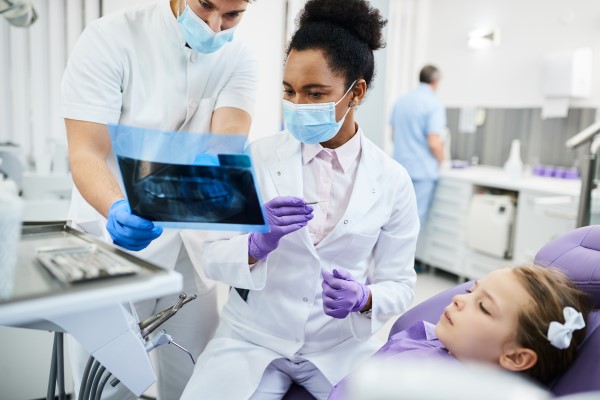4 Questions to Ask a Pediatric Dental Specialist About Pediatric Dental X-Rays

Pediatric dental x-rays are helpful tools that allow dentists to provide targeted dental care to their young patients. Dental x-rays allow dentists to diagnose dental and orthodontic problems. Periodic x-rays allow pediatric dental specialists to monitor the growth and development of their young patients’ mouths.
While the benefits of kids’ x-rays are pretty obvious, many parents will have their misgivings. The low levels of radiation that come with x-ray imaging are a common concern. Keep reading to learn more about children’s dental x-rays.
4 Common questions about pediatric dental x-rays
X-rays pass easily through the body's soft tissues, but they find an obstacle in dense, hard tissue like cartilage, bone, and teeth. This interaction with different types of tissue is the principle behind x-ray imaging. A radiologist or dentist will take an x-ray by doing the following:
- The dentist will position the child in a special seat near the x-ray machine
- They will cover the child’s torso with a lead apron and tie a thyroid protector around the child’s neck
- Next, the dentist will position a frame with an x-ray film in the child’s mouth
- They will ask the child to bite down on the film
- Lastly, the dentist will turn on the x-ray machine, which will direct x-rays toward the film in the child’s mouth
Here are some common questions parents ask pediatric dental specialists about kids’ x-rays:
1. Are pediatric dental x-rays necessary?
X-rays are a diagnostic tool that allows dentists to find out what is going on beneath the gums. Without x-rays, a pediatric dentist could miss dental problems like cysts, impacted teeth, and orthodontic issues.
Periodic x-rays are a monitoring tool that allows dentists to track the growth and development of the oral cavity.
2. Who performs a dental x-ray?
Most dentists have the know-how and certification to perform pediatric dental x-rays. Many others work with radiologists who may be in-house staff or external consultants.
3. Are pediatric dental x-rays safe?
Yes, they are. The amount of radiation that comes out of an x-ray machine is comparable to the amount of radiation the body absorbs from the sun in a few minutes. Also, precautionary measures like a lead apron further minimize the radiation the patient is exposed to. It is also good to know that digital x-rays put out less radiation than their analog cousins.
4. How often does a child need a dental x-ray?
It depends. A child with no apparent dental problems will only need an annual set of x-rays. However, a young patient with ongoing dental issues may need x-rays once every couple of months.
Ready to set up an appointment?
When was your child's last dental check-up visit? If it is time for their next visit, we encourage you to contact our dental office today to schedule an appointment with a pediatric dental specialist. Your child will receive a thorough examination of their teeth, gums, and mouth, as well as pediatric dental x-rays if necessary.
Request an appointment here: https://nettsmiles.com or call Nett Pediatric Dentistry & Orthodontics at (623) 759-7658 for an appointment in our Phoenix office.
Check out what others are saying about our dental services on Yelp: Pediatric Dentist in Phoenix, AZ.
Recent Posts
Regular visits to a pediatric dentist who specializes in young patients are an important part of establishing good oral health practices. Many instances of severe dental conditions in children stem from either a lack of regard for proper hygiene or a lack of knowledge on the proper ways to care for a child's teeth. Check…
Pediatric dental care supports children's health, comfort, and development. Not only does it strive to detect and treat oral health problems early, but it also desensitizes children to dental visits to make each experience more comfortable. This special care and attention can motivate children to take good care of their teeth from a young age.Dental…
Cavity treatment for kids is a chief concern among parents, and for a good reason. Cavities are common in children of all ages. According to the Centers for Disease Control and Prevention, over half of the kids ages 6 to 8 have had at least one cavity in a primary tooth. The good news is…
Pediatric dentistry focuses on the oral problems that occur in children. Many dental issues in kids are similar to those that occur in adults. Without proper treatment, dental problems can progress to misaligned teeth and poor oral health. If you want to maintain your child’s dental health, here are the common dental issues that pediatric…


